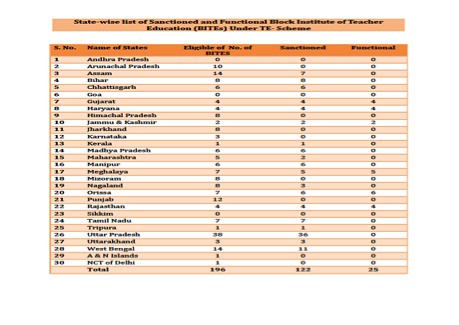By Amjad Suri and Mohammed Imteyaz Ahmed for Twocircles.net
The Sarvasiksha Abhiyan (SSA) was introduced in 2000 to bridge the gap between the social category and the quality of education in response to the growing demand for quality education. The aim of SSA was to allow children to learn, harness the human potential to its maximum and working on the principle of community solidarity with opportunity of free expression and communication.
SSA is the main vehicle for implementation of the Right to education (RTE) Act and provides financial support for in-service training. Under the SSA, 20 days in-service training is provided to school teachers, 30 days orientation for freshly-trained recruits and 60 days refresher course for untrained teachers.

With a framework for providing quality education to the weaker sections in society, Human Resource Development Ministry has approved setting up of Block Institutes of Teachers Education (BITE) in 196 districts in 2013. These institutes will be opened in SC/ST/Minority concentrated districts. More than Rs 690 crore have been approved, with one-third of the investment allocated to eight deficit states of Uttar Pradesh, Bihar, West-Bengal, Assam, Odisha, Chhattisgarh, Jharkhand and Madhya Pradesh.
The Centrally Sponsored Scheme of Teacher Education (CSSTE) was initiated in 1987 pursuant to the formulation of the National Policy on Education, 1986 and the same has been revised in June 2012. As per the revised terms and condition of CSSTE, the State Government of UP was eligible for establishment of 38 BITE (21 BITE in minority concentrated districts and 17 in SC/ST concentrated districts). Furthermore, the State Government of Bihar was eligible for establishment of 8 BITE.
However, beyond the frameworks, if one were to analyse state-wise sanctioned and eligible BIET, a dismal picture emerges of the functional scenario under teacher education scheme.
Delhi-based Imteyaz Ahmed had filed an RTI query with Ministry of human resource development (MHRD) on Apr 18, seeking a request of proposal on the current establishment and the progress on number of approved BITEs in identified SC/ST & minority concentrated districts in Bihar and UP. As per a reply furnished by Information officer, respective letter has been issued to State Government and union territories from the level of Joint secretary, additional secretary to the education and principal secretaries to implement the CSSTE (Centrally Sponsored Scheme of Teacher Education) scheme on 22nd, January 2016. The circulars to the states/UTs is also available on the ministry of minority website.
Out of the total sanctioned 36 BITEs in U.P (21 in Minority concentrated blocks and 15 in SC/ST Blocks) in the year 2013-2014, only 8 BITEs was approved in minority concentrated districts: this includes Moradabad, Bareilly, Bulandshahar, Amroha, Saharanpur, Barabanki, Lucknow, Badaun and the Uttar Pradesh government was advised to submit the details of expenditure as well as progress of the approved BITEs.
Furthermore, the situation in Bihar is no different to UP on BITEs approval. The Teachers education appraisal board (TEAB) approved only 4 BITEs in Musapur, Dariyapur, Madhopatti and Balmiki Nagar out of the eight sanctioned in Minority Concentrated Districts.
The government’s policy for elementary education has a foundation for inclusive education and includes strategies for sensitization of teachers to the specific needs of children belonging to SC/ST and minorities. The communication gap between the MHRD and the respective states seems to be lackadaisical particularly in identification and approval of BITEs with the minority concentrated districts.
Former Human Resources Development Minister Smriti Irani had recently launched teacher education portal Prashikshak for District Institutes of Education and Training in New Delhi.
DIET are district-level educational institutes which have been established in each district of India by the Indian government to provide academic and resource support at the grass root level for the success of the various strategies and programmes in the areas of elementary and adult education.
The objective of Prashikshak portal is to help DIETs make informed decisions about their institutes, compare the performance of their institute against other DIETs in the state and country as well as help aspiring teachers make informed decisions about which institute to join.
However, nothing was mentioned about BITE in minority concentrated districts during the launch event. Present MHRD in the context of minority and SC/ST education sanctioned only 122 BITEs out of 196 approved in 2013.Out of the 122 sanctioned BITEs only 25 are functional.
To sum up, the Ministry of HRD seems to have circumvented the BITEs establishment for District institute of Teachers education.
In addition, as DIET activities gain in importance and relevance, adapting the BIET framework to the specific circumstances to SC, ST and minority concentrate districts becomes critical to ensure that any emerging gaps on teachers training can be promptly managed. This is especially important when DIET is co-related with prudential standards and rules that could facilitate a set of stable, efficient and integrated BIET.
(Amjad Suri is a financial consultant and Mohammed Imteyaz Ahmed is a medical practitioner)
